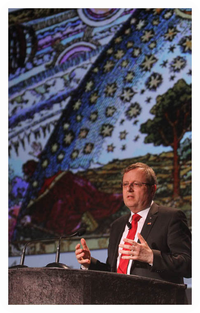Spotlight
Global Leaders Discuss Collaboration
Written by: developer
 In her role as moderator, NASA Deputy Administrator Lori Garver kicked off the Global Leaders: National Programs – International Collaboration panel at the 27th National Space Symposium by referencing the NASA vision “to reach for new heights and reveal the unknown so that what we do and learn will benefit all mankind,” saying that there is a strong bilateral consensus on space in the United States about the need to explore space beyond low-Earth orbit (LEO).
In her role as moderator, NASA Deputy Administrator Lori Garver kicked off the Global Leaders: National Programs – International Collaboration panel at the 27th National Space Symposium by referencing the NASA vision “to reach for new heights and reveal the unknown so that what we do and learn will benefit all mankind,” saying that there is a strong bilateral consensus on space in the United States about the need to explore space beyond low-Earth orbit (LEO).
Garver said an asteroid mission represents the best compromise between current capabilities and the capabilities NASA will need to acquire to enable further human exploration, adding that NASA realizes the need to work differently with industrial partners and that using fixed-price contracts for basic tasks, such as sending people into space, allows NASA to devote its funds to developing breakthrough disruptive technologies and exploration. “It is nonetheless critical that the U.S. be able to send U.S astronauts, flying on U.S. vehicles, to the International Space Station,” she said.
Farina Outlines Canada’s Approach
Chummer Farina, vice president of the Canadian Space Agency (CSA), said international cooperation is a necessity for Canada, especially because it has no launch capability. Plus, he said, Canada seeks to leverage niche science and technology capabilities and expertise in its international cooperative efforts.
Farina explained that the Canadian space program is organized into three groups:
- The space utilization department serves the needs of other Canadian government departments and works on projects that include RADARSAT, space situational awareness, solar weather monitoring and ground infrastructure.
- The technology development department builds primary capacity both for Canadian industry and the Canadian government.
- The exploration group leverages Canadian expertise in robotics, working with ESA and NASA on Mars exploration, the ISS and the International Space Exploration Coordination Group on Earth observation, satellite communications, exploration and industrial strategic alliances.
Farina said challenges include an increasingly tight budget environment in Canada and increasing difficulty in creating a consensus as more nations become active in space.
Wörner
Dr. Johann-Dietrich Wörner, chairman of the Executive Board of the German Aerospace Center (DLR), noted that the historic politically competitive context of space has limited global cooperation, adding that there are even roadblocks in Europe because of industrial competition and national pride. In the future, he said he expects enhanced cooperation and collaboration and unrestricted international commercial engagement. He also said he expects greater synergies between robotic and human exploration, with robotic exploration as a first step, leading ultimately to human exploration.
Wörner said that future exploration objectives will be set at the governmental level and funded publicly, including participation from academia. He said public infrastructure efforts and security applications should be specified by governments and that synergies through more complete exploration of the dual-use space will provide for new avenues for cooperation discussions. Finally, he said, a new coalition between technology and culture will be a significant driver of global space activity.
During the question and answer session, Farina indicated that budgets will be the biggest immediate barrier to international cooperation, while Wörner noted that partnerships between “senior” and “junior” members are ultimately untenable, and must be replaced with a real partnership of peers.
Farina said CSA uses fixed price contracts where possible, but that imposition of a fixed-price structure may simply increase programmatic risk. Wörner said that, in the German context, fixed price contracts have been valuable in research efforts.
Finally, the panelists said that since many space technologies, such as Earth observation, are inherently dual use, civil space cooperation is, on some level, inextricable from security space cooperation. For smaller space programs, they said, international cooperation is a requirement for any use of space for security purposes.
Pictured: Dr. Johann-Dietrich Wörner
This article is part of Space Watch: May 2011 (Volume: 10, Issue: 5).


